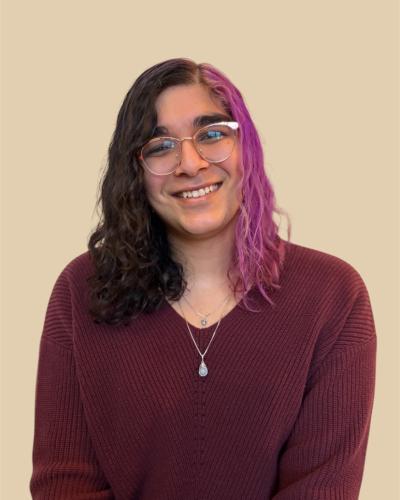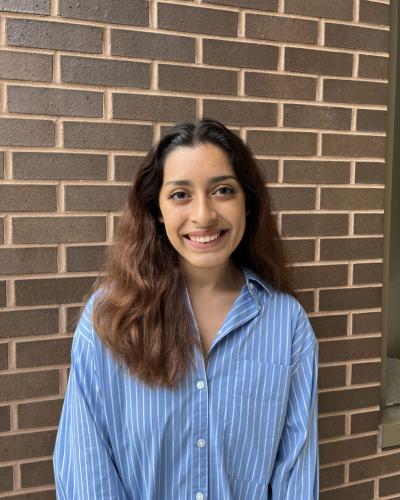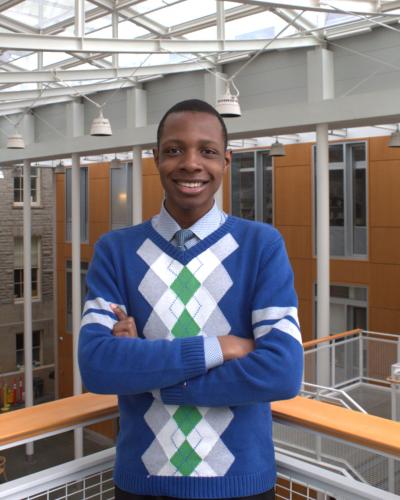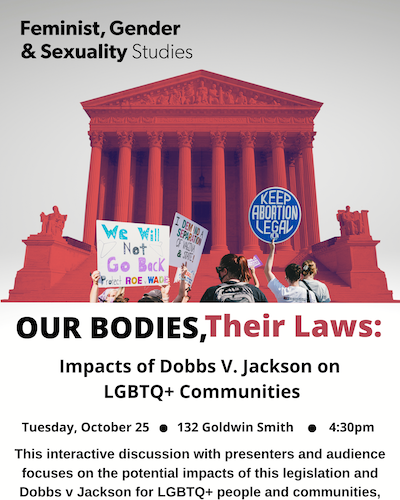Our Bodies, Their Laws: Impacts of Dobbs v. Jackson on LGBTQ+ Communities
Tuesday, October 25, 2022 at 4:30pm
Goldwin Smith Hall, 132
232 East Ave, Central Campus
What does the Dobbs decision to overturn Roe vs Wade have to do with LGBTQ+ people? A lot, it turns out. LGBTQ+ people are directly affected by the Dobbs v. Jackson decision compromising access to abortions because queer and trans people also need access to reproductive health care. The right to privacy, guaranteed by the Fourteenth Amendment’s Due Process Clause, is the foundation for abortion rights (Roe and Casey), and it is the bedrock for both same-sex sexual intimacy (Lawrence v. Texas) and same-sex marriage (Windsor v. United States and Obergefell v. Hodges). The Supreme Court ruled in Dobbs v Jackson that the Fourteenth Amendment’s due process protection of liberty does not include a federal right to abortion. This verdict rescinds a right to privacy that has safeguarded citizens’ autonomous decisions with respect to their most intimate and personal life choices for nearly fifty years. What other rights are vulnerable in the wake of this ruling? How does this ruling intersect with the rise in anti-trans legislation across the country? This interactive discussion with presenters and audience focuses on the potential impacts of this legislation and Dobbs v Jackson for LGBTQ+ people and communities, including the issues of gay marriage, queer kinships, and transgender healthcare and rights.
Discussion leaders include Sara Warner, Associate Professor of Performing and Media Arts and Director of LGBT Studies; Stacey Roy '25, School of Industrial and Labor Relations and Community Engagement Coordinator for QSWARE (Queer Sexual Wellness and Relationship Education); and Cortney Johnson, Associate Dean of Students and Director of the LGBT Resource Center.
OUR BODIES, Their Laws Fall 2022 event series:
The Supreme Court’s decision to ignore decades of precedent and overturn Roe v. Wade in June 2022 is merely the latest instantiation of government policy that controls and criminalizes bodies, especially those of marginalized communities. Reproductive coercion has formed the bedrock of United States population policy since from early colonization and slavery to sterlization abuses against Black and Brown women, to the separation of families and forced hysterectomies in the camps on the US/Mexico border. Proliferating efforts to ban gender affirming care and inclusive learning environments for trans and queer youth weave together a broader patchwork of policies showcasing the state’s disregard for the humanity of gendered and racialized “others.”
While the Dobbs decision represents “business as usual” for US reproductive policy, it is also an inflection point. New generations of activists are awakening to struggles for justice. Previously siloed white feminists realizing that silence is no protection in a racist heteropatriarchal system. We therefore see this as a moment to gather, to care for and listen to each other, to learn about ongoing and interconnected struggles to get free, and to get to work.
Please join us for our next installment of this series:
Please adhere to Cornell University’s COVID-19 guidelines. Stay informed at https://covid.cornell.edu.
If you need accomodations to participate in this event, please contact Maria or Aidan at fgss@cornell.edu.
Are you interested in taking a student leadership role in these events and/or do you have any expertise in areas you would like to share with others? Give us your feedback! We’d love to hear from you! Email fgss@cornell.edu.
This series is sponsored by the Feminist, Gender, & Sexuality Studies Program, the Women's Resource Center, Cornell Health, the Cornell Law School Gender Justice Clinic, and End Abortion Stigma





